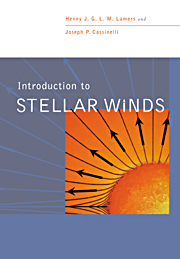Book contents
- Frontmatter
- Contents
- Preface
- 1 Historical overview
- 2 Observations of stellar winds
- 3 Basic concepts: isothermal winds
- 4 Basic concepts: non-isothermal winds
- 5 Coronal winds
- 6 Sound wave driven winds
- 7 Dust driven winds
- 8 Line driven winds
- 9 Magnetic rotator theory
- 10 Alfvén wave driven winds
- 11 Outflowing disks from rotating stars
- 12 Winds colliding with the interstellar medium
- 13 The effects of mass loss on stellar evolution
- 14 Problems
- APPENDIX 1 The chronology of stellar wind studies
- APPENDIX 2 Elements of thermodynamics
- APPENDIX 3 De l'Hopital's rule for equations with a singular point
- APPENDIX 4 Physical and astronomical constants
- Bibliography
- Object index
- Index
12 - Winds colliding with the interstellar medium
Published online by Cambridge University Press: 05 June 2012
- Frontmatter
- Contents
- Preface
- 1 Historical overview
- 2 Observations of stellar winds
- 3 Basic concepts: isothermal winds
- 4 Basic concepts: non-isothermal winds
- 5 Coronal winds
- 6 Sound wave driven winds
- 7 Dust driven winds
- 8 Line driven winds
- 9 Magnetic rotator theory
- 10 Alfvén wave driven winds
- 11 Outflowing disks from rotating stars
- 12 Winds colliding with the interstellar medium
- 13 The effects of mass loss on stellar evolution
- 14 Problems
- APPENDIX 1 The chronology of stellar wind studies
- APPENDIX 2 Elements of thermodynamics
- APPENDIX 3 De l'Hopital's rule for equations with a singular point
- APPENDIX 4 Physical and astronomical constants
- Bibliography
- Object index
- Index
Summary
Stars interact with the surrounding interstellar medium (ISM), both through their ionizing radiation and through the mass, momentum, and energy that is transferred by way of their winds. The extreme ultraviolet radiation from hot stars leads to ionized nebulae or H II regions around young stars. In the case of low mass stars about to become white dwarfs, the radiation leads to the ionization of planetary nebulae.
The mass loss in stellar winds leads to a recycling of matter back to the interstellar medium, and because of the nuclear processing that occurs in the interiors of stars, the matter which is returned is often chemically enriched. In the cases of late type giants and carbon rich Wolf-Rayet stars, dust grains are produced in the winds, so the outflows may carry grain enriched material into the interstellar medium. These grains could play a role in the next generation of star formation. There are also dynamical effects associated with wind-interstellar medium interactions. The collisions of the winds with their surroundings produce ‘wind bubbles’, and the momentum transfer helps to maintain the random velocities of interstellar clouds that otherwise would be damped out by the dissipative effects of cloud collisions.
The winds of ‘massive stars’ tend to have the greatest effect on the ISM, because their mass loss rates are large, and the massive stars that are hot also have winds that are very fast and carry large momentum fluxes.
Information
- Type
- Chapter
- Information
- Introduction to Stellar Winds , pp. 355 - 384Publisher: Cambridge University PressPrint publication year: 1999
